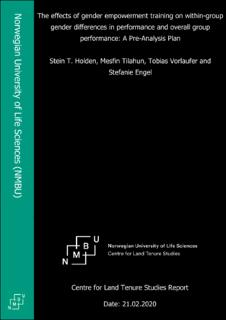Effects of Women Land Rights on Agricultural Outcomes in Rwanda
This study examines the effect of land rights on agricultural outcomes in Rwanda. We characterize the effects of land rights from two perspectives. The first one is land rights indicated by the right to sell and guarantee land and the second one is land titling. The agricultural outcomes include agricultural productivity, food security and nutritional diversity. From the results, land rights are found to have a positive relationship with all the outcome variables. The effect of land rights on agricultural productivity is larger if the household head is male.




